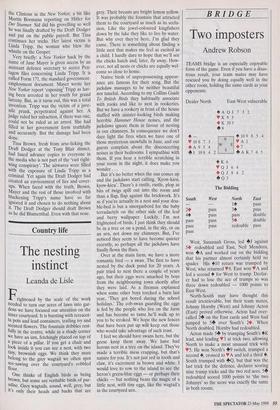Country life
The nesting instinct
Leanda de Lisle
Frightened by the scale of the work needed to turn our acres of lawn into gar- dens we have focused our attention on the inner courtyard. It is bursting with terracot- ta pots and lead containers, trailing ivy and scented flowers. The fountain dribbles rest- fully in the centre, while in a shady corner we have an urn, fetchingly placed on top of a Piece of a pillar. If you get a chair and look inside it you can see a nest, with two tiny, brownish eggs. We think they must belong to the grey wagtail we often spot see-sawing over the courtyard's cobbled floor.
One thinks of English birds as being brown, but some are veritable birds of par- adise. Grey wagtails, sound, well, grey, but it's only their heads and backs that are grey. Their breasts are bright lemon yellow. It was probably the fountain that attracted them to the courtyard as much as its seclu- sion. Like the jewel-coloured kingfishers down by the lake they like to live by water. But why ever they're here, I'm glad they came. There is something about finding a little nest that makes me feel as excited as a child. I hardly dare to hope that we'll see the chicks hatch and, later, fly away. How- ever, not all nests or chicks are equally wel- come so close to home.
Native birds of unprepossessing appear- ance are famous for their song. But the jackdaw manages to be neither beautiful nor tuneful. According to my Collins Guide To British Birds they habitually associate with rooks and like to nest in rookeries. But we have a rookery in front of the house stuffed with sinister-looking birds making horrible Hammer House noises, and the jackdaws ignore them in favour of nesting in our chimneys. In consequence we don't dare light the fires when we have one of those mysterious snowfalls in June, and our guests complain about the disconcerting noises in their bedrooms. I sympathise with them. If you hear a terrible scratching in your room in the night, it does make you wonder...
But it's no better when the sun comes up and the jackdaws start calling, ayow-kieu, kyow-kieu'. There's a rustle, rustle, plop as bits of twigs spill out into the room and than a flap, flap against the brickwork. It's as if you're actually in a nest and your dou- ble-bed is but a smorgasbord for the baby terradactyls on the other side of the leaf and berry wallpaper. Luckily, I'm not frightened of birds. I just think they should be in a tree or on a pond, in the sky, or on an urn, not down my chimneys. But, I've noticed they seem to have become quieter recently, so perhaps all the jackdaws have finally flown the flues.
Over at the main farm, we have a more romantic bird — a swan. The first to have nested by the duck pond for 20 years. A pair tried to nest there a couple of years ago, but their eggs were smashed by boys from the neighbouring town shortly after they were laid. As a fireman explained when some other boys torched a barn last year, 'They got bored during the school holidays.' The cob-swan guarding the eggs is fed by the people who live on the farm and has become so tame he'll walk up to you to be stroked. We hope the new fences that have been put up will keep out those who would take advantage of such trust.
I feel we should have swans here, but the geese keep them away. We have had herons nest in a tree on the island. They've made a terrible mess crapping, but that's nature for you. It's not just red in tooth and claw, it's excrement in brown and white. I would love to row to the island to see the heron's green-blue eggs — or perhaps their chicks — but nothing beats the magic of a little nest, with tiny eggs, like the wagtail's in the courtyard urn.


































































 Previous page
Previous page